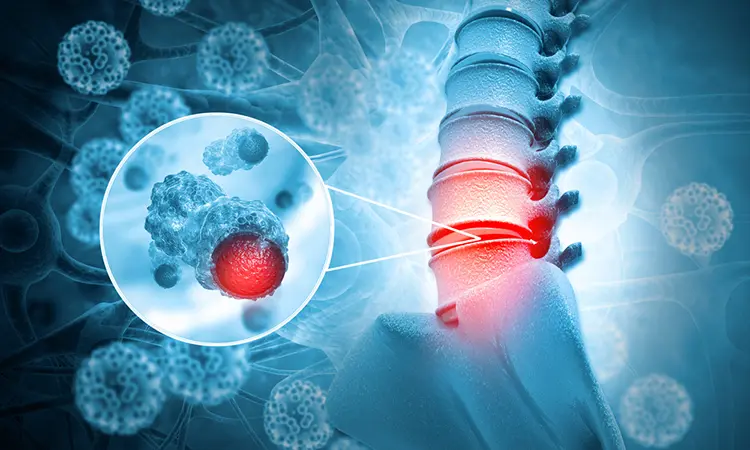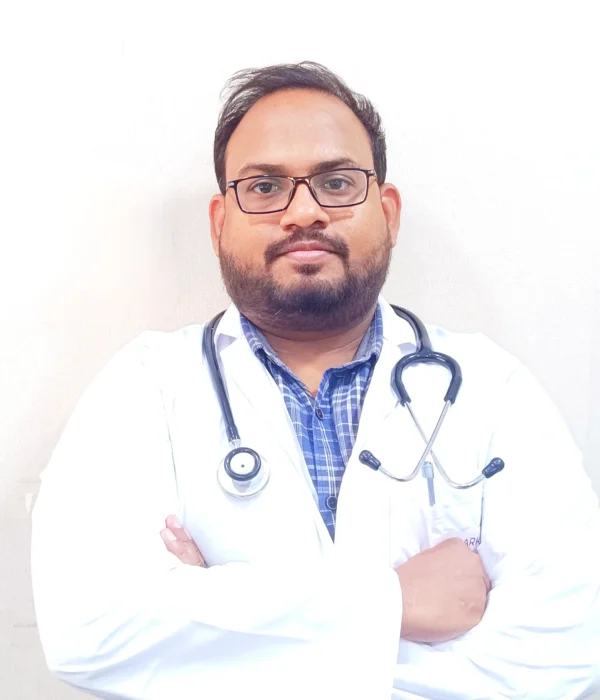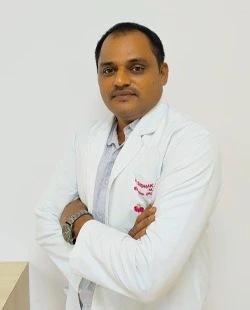Chordoma Overview
Chordoma is a rare type of cancer that occurs in the bones of the spine and skull base. It develops from remnants of the notochord, an embryonic structure. Chordomas are slow-growing but can be locally aggressive and challenging to treat due to their proximity to critical structures like the spinal cord and brainstem. At Fight Bone Tumors, Dr. Kishore B Reddy and our expert team provide specialized care for patients with chordoma, utilizing advanced diagnostic tools and personalized treatment plans to effectively manage this complex disease.
Symptoms:
The symptoms of chordoma can vary depending on its location, but common signs include:
- Pain: Persistent pain in the lower back, neck, or head.
- Neurological Symptoms: Numbness, tingling, or weakness in the limbs, difficulty walking, or changes in bladder and bowel function.
- Headaches: Often severe if the chordoma is at the base of the skull.
- Visual Disturbances: Double vision or other vision problems if the tumor affects the cranial nerves.
- Swelling or Lump: Noticeable in the affected area.
Early detection and treatment are crucial for preventing complications and improving outcomes.
Diagnosis:
Diagnosing chordoma involves several tests to confirm the presence of the tumor and assess its extent:
- Physical Examination: Initial assessment to evaluate symptoms and overall health.
- Imaging Tests: MRI, CT scans, and X-rays to visualize the tumor, determine its size, and understand its relationship with nearby structures.
- Biopsy: A sample of the tumor tissue is taken and examined under a microscope to confirm the diagnosis.
Accurate diagnosis is essential for developing an effective treatment plan.

Treatment Options:
Treatment for chordoma is complex and often involves a combination of therapies. Our approach includes:
Surgery:
- En Bloc Resection: Removing the tumor in one piece along with a margin of healthy tissue. This is the preferred method to achieve complete tumor removal.
- Debulking Surgery: Reducing the size of the tumor when complete removal is not possible.
Radiation Therapy:
- Proton Beam Therapy: A precise form of radiation therapy that targets the tumor while sparing surrounding healthy tissue.
- Intensity-Modulated Radiation Therapy (IMRT): Allows high doses of radiation to be delivered to the tumor with minimal impact on nearby structures.
Targeted Therapy:
- Investigational therapies that focus on specific molecular targets within the tumor.
Chemotherapy:
- Generally less effective for chordomas but may be used in certain cases, especially when other treatments are not viable.
Our multidisciplinary team collaborates to develop personalized treatment plans aimed at achieving the best possible outcomes for our patients.
Support and Rehabilitation:
Dealing with chordoma involves more than just medical treatment. We offer comprehensive support services to help patients and their families through this journey:
Physical Therapy:
- Essential for recovery post-surgery, aiding in regaining strength and mobility.
Emotional Support:
- Counseling and support groups to address the emotional and psychological impacts of living with chordoma.
Nutritional Guidance:
- Tailored dietary plans to support overall health and recovery during and after treatment.
Follow-Up Care:
- Regular check-ups to monitor for recurrence and manage any long-term side effects of treatment.
FAQ's
Chordoma is a rare type of cancer that occurs in the bones of the spine and skull base. It develops from remnants of the notochord, an embryonic structure.
Common symptoms include persistent pain, neurological symptoms, headaches, visual disturbances, and a noticeable swelling or lump in the affected area.
Diagnosis typically involves a physical examination, imaging tests (MRI, CT scans, X-rays), and a biopsy to confirm the diagnosis.
Treatment options may include surgery (en bloc resection, debulking surgery), radiation therapy (proton beam therapy, IMRT), targeted therapy, and chemotherapy in certain cases.
En bloc resection surgery involves removing the tumor in one piece along with a margin of healthy tissue to achieve complete tumor removal.
Yes, potential side effects can include pain, swelling, risk of infection, and challenges related to rehabilitation post-surgery. Specific treatments may have their own unique side effects.
Managing side effects can involve rest, physical therapy, proper nutrition, pain management medications, and emotional support through counseling or support groups.
We offer physical therapy, emotional support, nutritional guidance, and regular follow-up care to monitor for recurrence and manage long-term side effects.
With early detection and appropriate treatment, many patients can achieve long-term remission. The prognosis depends on the tumor’s size, location, and the effectiveness of the treatment.
You can schedule a consultation by calling us at +91 9032027279 or emailing info@fightbonetumors.com. Our team is here to provide personalized care and support.




